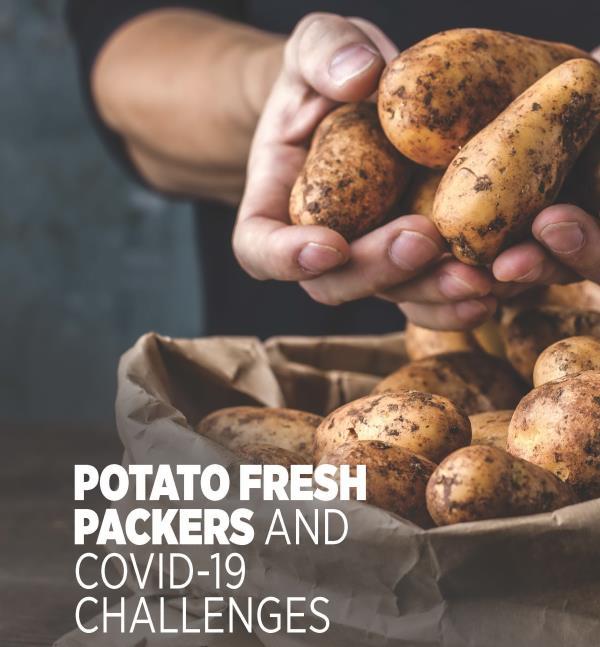New eBook for potato fresh packers from TOMRA Food
July 7, 2020 TOMRA Food has published an eBook. A 19-page publication designed to help fresh potato packers to tackle challenges caused by the COVID-19 pandemic. It offers advice and information, which will be helpful to packhouses now, while market conditions distorted, but also after the pandemic has passed.
The eBook starts by reporting how the monetary value of potato sales at multiple-outlet supermarkets increased by 67%. Many potato growers and processors have been hit by a loss of demand from foodservice outlets, other growers and packers are thriving because retail sales of fresh packaged potatoes have increased due to the frequency of home cooking. Consumers have rediscovered fresh potatoes but unknown whether this newfound fondness will last.
The eBook observes keeping up with demand by increased throughputs is the biggest challenge faced by many packhouses during the pandemic. Another demand-related challenge is the need to seize the opportunity to gain a new business. However, some packers lack the operational systems, line technologies, or people power to do this.
Difficulties recruiting and retaining manual labor, familiar to packhouses for many years already. These difficulties have been intensified by the pandemic as many packing businesses rely on temporary foreign workers but due to travel restrictions, in many places this labor resource has dried up.
The growing popularity of fresh potatoes means it has become a weapon of choice in the battle between supermarkets to tempt shoppers with special offers. Such offers change quickly from one week to the next and this means that packhouses must have the ability to switch the line from one potato type or product specification to another as soon as possible.
The eBook also focuses attention at the longstanding needs for consistent product quality, which can be as influential as supply and demand in determining profitability, and improved productivity. Because typical pack-out rates of 60-80% mean that packers are losing 20-40% of incoming product. These figures indicate the value of product recovery.
In conclusion, the new TOMRA Food eBook explains how all of these challenges can be solved with optical sorting technologies. As a major advantage, sorting machines ensure food safety and consistent product quality by eliminating foreign material and unmarketable potatoes from the packing line. This also allows sorters to reduce their dependence on manual labor; maximize yields by recovering product that need not be wasted; improve throughput by identifying line-flow issues; and accurately grade each potato to make sure that the product meets the required specifications.
A copy of the eBook, titled ‘Potato Fresh Packers and COVID-19 Challenges’, can be downloaded here.
Media Contact:
Marijke Bellemans
Marketing Communication Manager TOMRA Food, Compac, and BBC Technologies
Research Park Haasrode 1622 – Romeinse straat 20
3001 Leuven, Belgium
T: +32 (0)16 74 28 17 M: +32 (0)476 74 19 18
E: marijke.bellemans@tomra.com





